The reverse tuck box market is experiencing sustained growth, supported by evolving packaging preferences across industries and increasing demand for customizable, eco-friendly solutions. Industry publications and packaging company press releases have emphasized the importance of reverse tuck boxes in streamlining product presentation, enhancing shelf appeal, and reducing material waste.
Their structure allows for easy assembly and secure closure, making them an efficient choice for high-speed packaging lines. Moreover, the market has benefited from advancements in digital printing and die-cutting technologies, enabling rapid prototyping and short-run customization across various sectors.
Sustainability-focused brands have also adopted reverse tuck boxes due to their recyclable nature and reduced use of adhesives. As global retail activity expands and e-commerce continues to grow, reverse tuck boxes are being adopted for their durability, branding potential, and cost-effective production. Looking forward, rising demand from sectors like food and beverage, pharmaceuticals, and personal care is expected to drive continued innovation and adoption, particularly in formats that support premium aesthetics and sustainable sourcing.
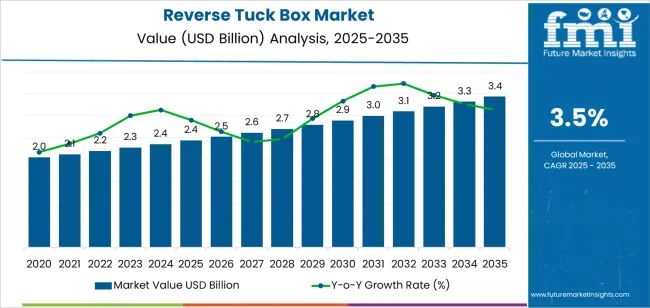
| Metric | Value |
|---|---|
| Reverse Tuck Box Market Estimated Value in (2025 E) | USD 2.4 billion |
| Reverse Tuck Box Market Forecast Value in (2035 F) | USD 3.4 billion |
| Forecast CAGR (2025 to 2035) | 3.5% |
The market is segmented by Product Type, Application, and End Use and region. By Product Type, the market is divided into Standard, Double Reverse, Triple Reverse, Quadruple Reverse, Collapsible Reverse, and Others (Pillow Style, Telescoping, Modular). In terms of Application, the market is classified into Retail Packaging, E-Commerce Shipping, Storage & Inventory, and Gift Packing. Based on End Use, the market is segmented into Food & Beverage, Industrial, Pharmaceutical, and Medical. Regionally, the market is classified into North America, Latin America, Western Europe, Eastern Europe, Balkan & Baltic Countries, Russia & Belarus, Central Asia, East Asia, South Asia & Pacific, and the Middle East & Africa.
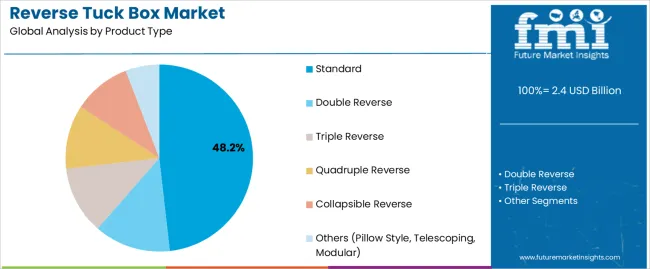
The Standard segment is projected to account for 48.2% of the reverse tuck box market revenue in 2025, establishing itself as the leading product type. This dominance has been supported by the segment’s versatility, ease of use, and widespread compatibility with automated packaging systems.
Manufacturers have favored standard reverse tuck boxes for their simple design, which reduces production time and supports efficient storage and transport. Packaging engineers have also preferred this format due to its structural strength and adaptability across various product dimensions.
Additionally, brands in competitive retail environments have utilized standard reverse tuck boxes to optimize branding space without compromising packaging speed or cost. As production runs scale up and demand for shelf-ready packaging increases, the Standard segment is expected to maintain its market leadership due to its balance of performance, functionality, and cost-efficiency.
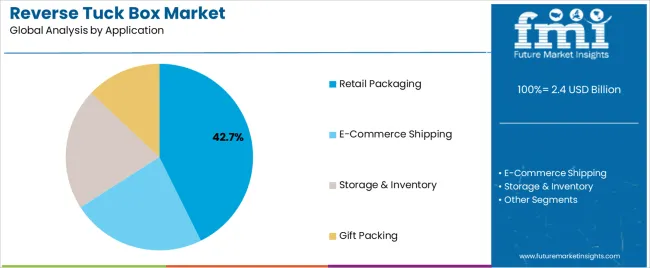
The Retail Packaging segment is forecasted to contribute 42.7% of the reverse tuck box market revenue in 2025, continuing its lead among application categories. Growth in this segment has been driven by the increasing emphasis on product visibility, shelf differentiation, and brand communication in retail environments.
Retailers and product manufacturers have prioritized packaging that enhances unboxing experience while also being easy to stack and display. Reverse tuck boxes have proven effective in accommodating these needs, offering a compact and protective solution that supports high-quality printing and custom design.
Consumer goods companies have increasingly adopted this packaging for items such as cosmetics, electronics, and accessories, where presentation and structural integrity are critical. Furthermore, the proliferation of premium and niche retail brands has reinforced demand for packaging that aligns with brand aesthetics and sustainability goals. These factors are expected to ensure the continued prominence of the Retail Packaging segment in the market.
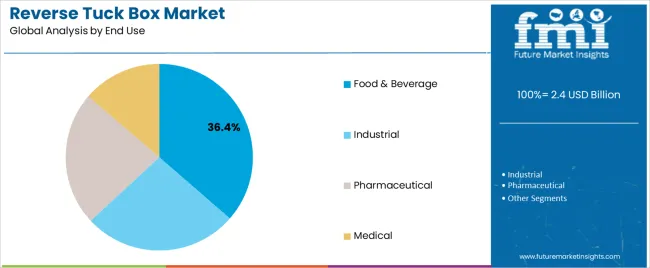
The Food & Beverage segment is projected to represent 36.4% of the reverse tuck box market revenue in 2025, positioning it as the leading end-use industry. This growth has been fueled by the rising need for safe, tamper-evident, and visually appealing packaging formats in the highly regulated food sector.
Producers of teas, snacks, confectionery, and nutritional supplements have increasingly relied on reverse tuck boxes for secondary packaging due to their ability to accommodate detailed labeling, barcoding, and branding elements. Industry regulations have further emphasized packaging hygiene and traceability, both of which are supported by the structural integrity of reverse tuck formats.
In addition, the shift toward premium and organic food products has driven adoption of packaging that combines sustainability with a high-end appearance. As consumer demand for recyclable and functional food packaging continues to rise, the Food & Beverage segment is expected to remain a primary driver of reverse tuck box utilization.
Reverse Tuck Box Trend Cultivates in the Gift Packaging Industry
Reverse tuck boxes are a popular choice in the gift packaging market because of how well they can package a wide range of goods, including drinks, food, jewelry, electronics, and cosmetics.
These boxes are a desirable option for shielding goods from harm because of their strength, reusability, and appealing look. Gift boxes are becoming more and more in demand in the upcoming decade.
Leading brands like Karl Knauer KG and DS Smith plc are pioneers in gift wrapping and personalized printing on tuck boxes, offering customizable options to cater to diverse customer preferences. Meanwhile, Zazzle and Etsy focus on minimalist designs for their tuck boxes, catering to a different market segment that values simplicity and elegance.
The corporate gifting culture is also anticipated to evolve as companies increasingly use these boxes to market themselves and build stronger relationships with their clients and employees.
This shift towards corporate giving is foreseen to compel further market expansion. The growing ubiquity of corrugated reverse tuck boxes, known for their strength, reusability, and visual appeal, is set to bolster market growth.
Given their usefulness and aesthetic appeal, which make them a popular option for both customers and businesses, reverse tuck boxes are anticipated to play a significant part in the gift packaging sector.
Incorporation of Sustainable Alternatives to Benefit the Reverse Tuck Box Industry
The increased need for consumer goods, paper boxes for medical components, and ecological products is driving the reverse tuck box business.
Growth in sales is anticipated to be pushed by government limitations on the use of plastic and public awareness of the advantages of eco-friendly packaging, underscoring the need for workable and environmentally acceptable packaging solutions.
The reverse tuck box industry is boosting as a result of betterment in packaging, environmental concerns, and the growing need for thin, recyclable, reusable paper boxes made of materials like paperboard and kraft paper. Because these eco-friendly alternatives follow the global trend toward greener practices, they attract more clients and businesses.
Consumers prefer stiff paper packaging, so there should be more development potential for the reverse tuck box business. Such a trend is predicted to spur innovation and expansion in the packaging sector because of its robustness and visual appeal.
Due to rising environmental concerns, regulatory compliance, and demand for sustainable packaging, the reverse tuck box market is augmenting significantly. Expansion is being manipulated by improvements in packaging technologies and a demand for recyclable materials. The market is poised to benefit from these prospects as stiff, paper-based packaging gains popularity.
E-commerce Integration of Reverse Tuck Boxes Boost Industry
The e-commerce sector is predicted to increase demand for reverse tuck boxes because of the growing quantity of online purchases throughout the globe. These adaptable, sturdy, and flexible packaging options guarantee safe and effective product transportation for a variety of sectors.
Their versatile design guarantees product integrity, which makes them an essential choice for a range of packaging requirements.
As companies and customers grow more ecologically, conscientious, multi-use tuck boxes are foreseen to become common. Packaging waste may be decreased by using reusable packaging options, such as reverse tuck cartons. Tuck boxes are still often used as one-time-use objects, which raises questions about packaging waste and its effects on the environment.
Environmental consciousness in the e-commerce industry is driving the adoption of sustainable packaging options. Businesses are spending money on packaging that satisfies requirements for product protection and supports ecological objectives.
Reverse tuck boxes, with their reputation for durability and versatility, are an important part of this change. Promoting recycling and reuse of this kind of packaging can assist the sector in lessening its environmental impact and advancing a more sustainable future.
The reverse tuck box industry heavily relies on the general population's changing consumer preferences and lifestyle trends. Increasing emphasis on sustainability and reusability is also likely to impact the demand for reusable boxes.
Besides this, technological developments such as hide and lock tuck, waterproof paper, and easy stick lids in the production processes and increasing research and development have also impacted the industry in the past.
The industry in the period between 2020 to 2025 exhibited a CAGR of 2.9%. Reverse tuck boxes are positioned to benefit from the growing trend of food delivery because of their reputation for efficiently using space in shipping, transit, and retailing during points of sale.
The future is bright for producers and merchants of reverse tuck boxes since millennials are driving this trend with their need for simple purchasing and quick delivery. The reverse tuck box market size expects a considerable valuation bump from USD 1,978.3 million in 2020 to USD 2,282.3 million in 2025.
After 2025, consumers and major industry players are anticipated to be embracing biodegradable packaging options more and more. Paper boxes are a common option because of their easy recycling and eco-friendliness. Reverse tuck boxes are growing more prevalent than alternatives made of plastic, and such a trend is fueling the sales of reverse tuck boxes.
Consumer desire for environmentally friendly packaging and growing environmental consciousness are the enterprising forces behind reusable tuck boxes.
Businesses provide reusable packaging options, and stringent policies and initiatives minimize the usage of single-use plastics. Recyclable tuck boxes are being used because of a mix of customer needs, legal restrictions, and company sustainability objectives.
The section discusses the region-wise analysis of the reverse tuck box industry. Data on key countries in several regions of the globe, including North America, Asia Pacific, Europe, and others, is provided.
Canada is anticipated to remain at the forefront in North America, with a CAGR of 3.4% through 2035. In South Asia and the Pacific, India is projected to witness a CAGR of 4.1% by 2035, leaving behind China at 3.6%.
| Countries | Value CAGR (2025 to 2035) |
|---|---|
| United States | 3.3% |
| Canada | 3.4% |
| Germany | 3.2% |
| United Kingdom | 3.1% |
| India | 4.1% |
| China | 3.6% |
The Indian reverse tuck box industry is showcasing a healthy CAGR of 4.1% for the forecast period of 2025 to 2035. Sustainable practices are equally as important in India's food and beverage packaging industry as innovation. Food packaging makers are driving the market for reverse tuck boxes by developing unique designs.
Producing their goods in visually appealing structures, confectionery manufacturers are also contributing to the market's anticipated increase in profitability. In response to the movement toward sustainability, regional developers are increasing the need for tuck boxes and ensuring a bright future for the sector.
China is also a lucrative marketplace for the reverse tuck box industry. It is slated to showcase a CAGR of 3.6% through 2035. China's booming online retail industry notably impacts the need for reverse tuck boxes. The need for efficient and eco-friendly packaging solutions to manage the rise in package delivery is growing as more consumers make purchases online.
Reverse tuck box designs that are creative and tailored specifically for e-commerce logistics are gaining popularity. These designs incorporate features like customizable branding possibilities, collapsibility for easy return shipment, and durable materials ideal for repeated use to satisfy the unique demands of the rapidly growing Chinese online retail business.
The reverse tuck box industry in Canada is estimated to report a CAGR of 3.4% for the forecast period of 2025 to 2035. An exciting opportunity for sustainable packaging solutions exists in Canada's reverse tuck box market, which is ideally positioned to gain from a combination of creative packaging concepts and the nation's varied ecosystems.
Leading the way in the creation of biodegradable materials from our abundant local resources, such as plant-based fibers and organic polymers, Canadian firms are exemplifying the principle of natural selection and driving a worldwide trend towards sustainable packaging.
In Canada, environmental organizations have concentrated on teaching the public to reuse resources like paper and wooden crates. The Canadian government is taking a proactive approach in encouraging its residents to reuse materials. This is anticipated to significantly boost the reverse tuck box business and provide assurances for its sustainable growth.
The reverse tuck box sector is augmenting the demand based on various factors across the globe. In 2025, on the basis of product type, standard reverse tuck boxes are in demand, whereas the retail packaging segment is developing a larger consumer base for reverse tuck boxes.
The majority of the general population shows a strong preference for standard reverse tuck boxes. It is projected that in 2025, these types of boxes will account for 24% of the revenue share in the global market.
| Product | Standard Reverse Tuck Box |
|---|---|
| Value Share (2025) | 24% |
With the introduction of unique standard reverse tuck boxes, manufacturers are not just entering the market but also creating a new wave in the packaging sector. These boxes are meticulously designed with a focus on detail and are crafted from high-quality materials, ensuring their sturdiness and durability.
Manufacturers go beyond just providing standard reverse tuck boxes. Several times, they offer a range of additional features such as lamination services, die-cut boxes, and window boxes.
Along with that, sometimes the manufacturers also provide complimentary doorstep delivery and three-dimensional mock-ups, all aimed at ensuring clients' satisfaction.
Reverse tuck boxes are utilized for various applications, such as retail packaging, e-commerce shipping, storage and inventory as well as gift packing. The retail packaging segment, as of 2025, holds the maximum share of 23% in the reverse tuck box industry.
| End Use | Retail Packaging |
|---|---|
| Value Share (2025) | 23% |
By using e-commerce platforms and websites to sell items directly to customers online, direct-to-consumer (D2C) firms are transforming the retail packaging sector. Among the many benefits of this approach are its ability to provide outstanding customer service, foster brand loyalty, and make investments in all consumer touchpoints, including retail packaging.
Retail packaging is a powerful tool for marketing, and direct-to-consumer (D2C) firms understand this. As such, they prioritize high-quality, practical, and visually pleasing packaging that reflects their values, personality, and target market.
The retailers concentrate on the retail segment's packaging functionality, creating solutions that safeguard the goods in transportation, taking special needs like fragility or perishability into account, raising customer satisfaction levels, and lowering the possibility of returns or unfavorable reviews.
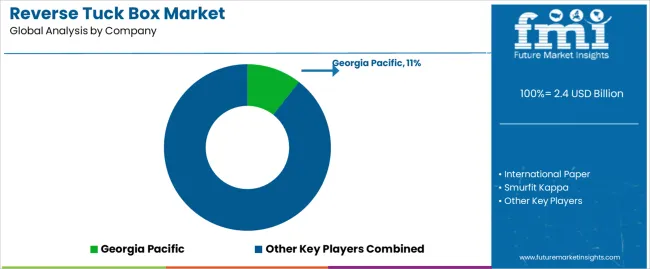
A number of companies are vying for global supremacy in the reverse tuck box market. These businesses understand the amount of local market expertise, customer preferences, and developing trends that domestic leaders and start-ups possess, and they frequently find value in working with them.
Such cooperative projects highlight the value of local knowledge in a global ecosystem while also providing access to greater production capacity and more effective manufacturing techniques.
Market players in the reverse tuck box market are concentrating on developing innovative products utilizing particular sustainable and eco-friendly materials, such as natural fibers and recycled paper. In addition to boosting sales in the e-commerce and retail sectors, leading manufacturers will be able to comply with stringent environmental regulations.
Some of the most prominent companies in the industry are Georgia Pacific, International Paper, Smurfit Kappa, and Mondi Group.
Industry Updates
In terms of product type, reverse tuck boxes are commonly available as standard, double reverse, triple reverse, quadruple reverse, collapsible reverse, and other boxes, such as pillow style, telescoping, and modular.
Reverse tuck boxes are classified based on applications into retail packaging, e-commerce shipping, storage and inventory, and gift packing.
As per the end-use, the industry is segmented into food and beverages, pharmaceuticals, industrials, and medical.
As per region, the industry is divided into North America, Latin America, Europe, Asia-Pacific, and the Middle East and Africa.
The global reverse tuck box market is estimated to be valued at USD 2.4 billion in 2025.
The market size for the reverse tuck box market is projected to reach USD 3.4 billion by 2035.
The reverse tuck box market is expected to grow at a 3.5% CAGR between 2025 and 2035.
The key product types in reverse tuck box market are standard, double reverse, triple reverse, quadruple reverse, collapsible reverse and others (pillow style, telescoping, modular).
In terms of application, retail packaging segment to command 42.7% share in the reverse tuck box market in 2025.






Our Research Products

The "Full Research Suite" delivers actionable market intel, deep dives on markets or technologies, so clients act faster, cut risk, and unlock growth.

The Leaderboard benchmarks and ranks top vendors, classifying them as Established Leaders, Leading Challengers, or Disruptors & Challengers.

Locates where complements amplify value and substitutes erode it, forecasting net impact by horizon

We deliver granular, decision-grade intel: market sizing, 5-year forecasts, pricing, adoption, usage, revenue, and operational KPIs—plus competitor tracking, regulation, and value chains—across 60 countries broadly.

Spot the shifts before they hit your P&L. We track inflection points, adoption curves, pricing moves, and ecosystem plays to show where demand is heading, why it is changing, and what to do next across high-growth markets and disruptive tech

Real-time reads of user behavior. We track shifting priorities, perceptions of today’s and next-gen services, and provider experience, then pace how fast tech moves from trial to adoption, blending buyer, consumer, and channel inputs with social signals (#WhySwitch, #UX).

Partner with our analyst team to build a custom report designed around your business priorities. From analysing market trends to assessing competitors or crafting bespoke datasets, we tailor insights to your needs.
Supplier Intelligence
Discovery & Profiling
Capacity & Footprint
Performance & Risk
Compliance & Governance
Commercial Readiness
Who Supplies Whom
Scorecards & Shortlists
Playbooks & Docs
Category Intelligence
Definition & Scope
Demand & Use Cases
Cost Drivers
Market Structure
Supply Chain Map
Trade & Policy
Operating Norms
Deliverables
Buyer Intelligence
Account Basics
Spend & Scope
Procurement Model
Vendor Requirements
Terms & Policies
Entry Strategy
Pain Points & Triggers
Outputs
Pricing Analysis
Benchmarks
Trends
Should-Cost
Indexation
Landed Cost
Commercial Terms
Deliverables
Brand Analysis
Positioning & Value Prop
Share & Presence
Customer Evidence
Go-to-Market
Digital & Reputation
Compliance & Trust
KPIs & Gaps
Outputs
Full Research Suite comprises of:
Market outlook & trends analysis
Interviews & case studies
Strategic recommendations
Vendor profiles & capabilities analysis
5-year forecasts
8 regions and 60+ country-level data splits
Market segment data splits
12 months of continuous data updates
DELIVERED AS:
PDF EXCEL ONLINE
Reverse Osmosis Pump Market Size and Share Forecast Outlook 2025 to 2035
Reverse Cap Bottles Market Size and Share Forecast Outlook 2025 to 2035
Reverse Logistics Market Size and Share Forecast Outlook 2025 to 2035
Reverse Transcriptase Enzymes Market Size and Share Forecast Outlook 2025 to 2035
Market Share Insights for Reverse Osmosis (RO) Pump Providers
Reverse Tuck Cartons Market
3D Reverse Engineering Software Market Forecast and Outlook 2025 to 2035
Q-Commerce Last-Mile Thermal Packs & Reverse Logistics Market Analysis - Size, Share, and Forecast Outlook 2025 to 2035
Tuck Top Box Market
Box Liners Market Size and Share Forecast Outlook 2025 to 2035
Boxboard Packaging Market Analysis - Size, Share, and Forecast Outlook 2025 to 2035
Box Compression Tester Market Size and Share Forecast Outlook 2025 to 2035
Box Latch Market Size and Share Forecast Outlook 2025 to 2035
Box Pouch Market by Pouch Type from 2025 to 2035
Box Filling Machine Market from 2025 to 2035
Box and Carton Overwrap Films Market Demand and Growth
Box and Carton Overwrapping Machines Market Insights and Growth 2025 to 2035
Boxcar Scars Market – Demand, Growth & Forecast 2025 to 2035
Box Sealing Machines Market Trends – Growth & Forecast 2025 to 2035
Competitive Breakdown of Box Pouch Providers

Thank you!
You will receive an email from our Business Development Manager. Please be sure to check your SPAM/JUNK folder too.
Chat With
MaRIA